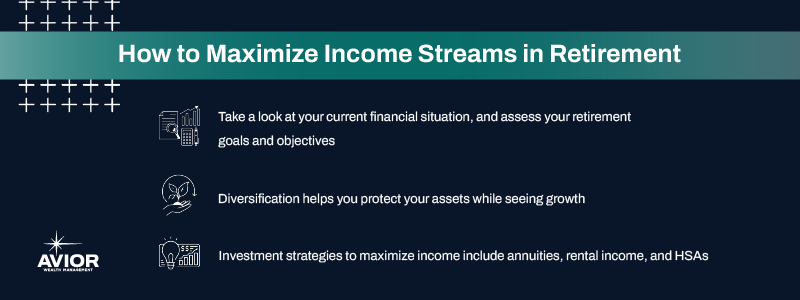How to Maximize Income Streams in Retirement
In retirement, you’ll be more financially secure if you can set up different income streams and diversify your investments.

Part of your wealth management journey is ensuring you’ll have a comfortable and secure retirement. While pensions and Social Security benefits may provide a baseline income, maximizing income streams is essential to maintain your desired lifestyle and cover unexpected expenses. Without the same work income in place, it can be a challenge to maintain a stable income in retirement.
This post explores various strategies to help you make the most of your resources when preparing for retirement, maximizing income streams, and improving financial security.
Assessing your retirement goals and current finances
First, revisit your retirement goals and think through your current financial standing. Ask yourself questions like when you want to retire, what kind of lifestyle you envision for yourself, and what activities or hobbies you want to pursue.
Be realistic about your expectations and consider factors like health care, travel, real estate, and potential long-term care needs. By establishing concrete goals, you’ll create a roadmap for all the funds required to support your desired retirement lifestyle.
At the same time, break down your current financial situation. Take stock of your assets, including savings, investments, and property, and list out your debt. Calculate your monthly expenses, distinguishing between essential and optional spending. Understanding your current financial health helps you make more informed decisions about saving, investing, and budgeting as you plan for retirement.
Why diversify income sources for retirement?
One important aspect of maximizing your income in retirement is having a diversified investment portfolio. Allocating assets across different investment classes, such as stocks, bonds, and real estate, can help mitigate risk and give you more consistent returns. You may also have a pension from work that can help balance out your income, and you can factor in Social Security benefits as well.
Diversification in the types of assets you invest in helps you ensure a steady income. If all of your money is invested in high-risk ventures, like stocks, in one market swing you could lose most of what you’ve saved. On the other hand, if you only invest in conservative options, you won’t see as much growth. Diversifying across asset classes helps you keep things balanced which will pay off over time.
Investment strategies for supplementing retirement income
You need to balance risk and reward to maximize your potential retirement income. Your strategy may change over time as you get closer to retirement and become more conservative to preserve your assets. However, here are a few general strategies that can supplement your retirement income:
1. Invest in annuities for guaranteed income
Annuities are financial products with insurance companies that offer a guaranteed income stream for a specified period or the rest of your life. Annuities can provide peace of mind by ensuring a steady flow of income, regardless of market fluctuations. Research various types of annuities, such as immediate annuities or deferred annuities, to find what aligns with your needs.
2. Explore dividend-paying stocks
Dividend-paying stocks can be a valuable addition to a retirement portfolio. Companies that regularly distribute dividends provide a steady income stream which can be especially beneficial for retirees seeking reliable cash flow. Look for stocks with a history of consistent dividend payments and a strong financial foundation. Talk to an advisor for assistance.
3. Consider rental income
If you own property, renting it can be an excellent way to generate additional income during retirement. Whether it’s a vacation home, a spare room, or an investment property, rental income can supplement your retirement funds. Keep in mind the responsibilities of being a landlord and ensure that the rental income covers maintenance and other associated costs.
4. Consider part-time opportunities
Retirement doesn’t necessarily mean complete withdrawal from the workforce. Many retirees find fulfillment and added income through part-time work or consulting in their area of expertise. This not only provides a financial boost but also keeps you mentally and socially engaged.
5. Start a health savings account (HSA)
Healthcare expenses can be a significant burden in retirement. HSAs offer a tax-advantaged way to save on medical costs. Contributions are tax-deductible and withdrawals for qualified medical expenses are tax-free. By strategically managing your HSA, you can minimize healthcare-related financial stress in retirement.
Tax planning and its impact on retirement income
Remember that certain tax obligations can take a big chunk of your retirement income. That’s why you must carefully plan and create a portfolio that minimizes the taxes you have to pay.
One component to consider is the tax treatment of different retirement accounts. For example, traditional IRAs and 401(k)s offer tax-deferred growth, allowing contributions to grow tax-free until withdrawal when you have to pay taxes on the income. Roth IRAs, on the other hand, provide tax-free withdrawals on qualified distributions so you don’t have to pay taxes on the income in retirement.
Think about when you’re likely to be in a higher tax bracket – now or in retirement. This helps you figure out when to pay taxes on the income to lower your liability.
You can also strategically choose when to start receiving Social Security benefits to optimize your tax situation. Diversifying income sources, such as incorporating tax-efficient investments and considering tax-efficient withdrawal strategies, can help minimize taxes overall.
Annual reviews of your tax strategy and staying informed about changes in tax laws will contribute to a proactive and effective tax planning approach. Then, you can maximize your spendable income, ensuring a more financially secure and comfortable retirement.
An example of an effective retirement income strategy may include a traditional 401(k) from your employer plus a Roth IRA so you get both sides of the tax benefits. Then, you diversify your portfolio to align with your risk tolerance, getting more conservative as retirement nears. You decide to delay your Social Security withdrawals until the full retirement age to maximize those benefits, and you invest in an HSA to help you deal with increasing healthcare costs. You also plan to rent out your property for extra income in retirement.
A personalized approach is required to tailor your retirement strategy to your and your family’s unique goals and priorities.
Maximize retirement income with the help of an advisor
When you’re thinking about how to maximize your retirement income, you’re already ahead of the game. Consider how diversification techniques and different types of investments can help you reach your goals and ensure you have a steady income.
The good news is that you don’t have to do it all on your own. A professional advisor at Avior can help you navigate proactive retirement planning, understand tax implications, and set up a personalized strategy that aligns with your wealth management goals.
Get in touch with Avior to talk to a financial expert about retirement planning.
Disclaimer: Nothing contained herein should be construed as legal or tax advice. Avior and our Advisors will work with your attorney and/or tax professional to assist with your legal and tax strategies. Please consult your attorney or tax professional with specific legal and/or tax questions. Investment Management and Financial Planner are offered through Avior Wealth Management, LLC, an SEC-registered investment advisor. Past performance is not a guarantee of future results. Investments are subject to loss, including the loss of principal.
No Comments
Sorry, the comment form is closed at this time.




